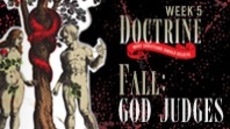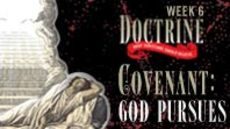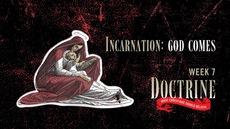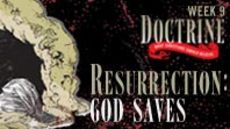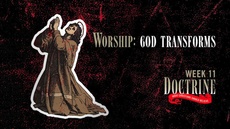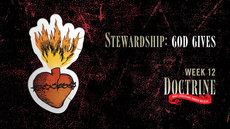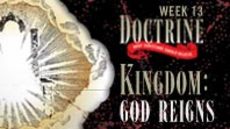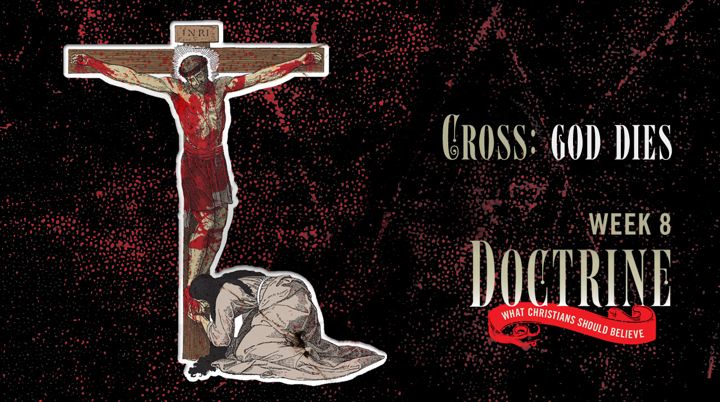
Can’t see the video? Download and install Flash to be able to view. Get Flash Here
At the literal crux of human history, Christ hangs on a tree. Jesus’ death for our sins has become in some cases so commonplace that we miss the brutality of it, and at the same time we forget how it perfectly demonstrates the love of God for us. Pastor Mark Driscoll teaches about the Cross, including some aspects of what Jesus’ death accomplished in this sermon from Doctrine – What Christians Should Believe. Click here for additional notes.
You are listening to Doctrine, a sermon series where Pastor Mark Driscoll covers the basic beliefs of Christianity. This series also serves as a prerequisite for membership at Mars Hill Church. For more audio and video content, visit MarsHillChurch.org.
Today we’re gonna deal with the cross and the fact that God came and died. What does that mean? How did Jesus die? Why did he die? What are the implications for us personally and corporately? So I’ll go ahead and pray, and we will deal with what I believe is the most important event in the history of the world, the cessation of life for the Lord Jesus, which is the beginning of our new life. So I will pray.
Father God, I thank you for an opportunity to teach the Bible. I love you. I love the Scriptures. I accept them as truth. We accept them as truth. It is our request, Lord God, that as we study today, for those of us who do not know Jesus, that we would understand with great clarity the purpose of his death. For those who do know you, Lord God, and maybe we have lost sense of the magnitude and majesty of the crucifixion of Jesus, that, God, today you would capture our affections, that you would reignite within us a deep passion to know, love, serve, trust, and obey the Lord Jesus, in whose name we pray. Amen.
Interestingly enough, when Christianity was in its infancy and the church began growing, Christians had to decide what the symbol of our faith would be. They considered a few options. Some proposed fishes and loaves, representing the lunch that a little boy gave to Jesus and he used to feed a multitude. Others suggested the rainbow, which was the sign of the covenant in the days of Noah. Others thought that perhaps a dove showing the Holy Spirit descending upon Jesus at the time of his baptism would be appropriate. Ultimately, though, the symbol that was roundly received and repeatedly put forth as the best symbol of the Christian faith is the cross.
Beginning with the early church father Tertullian, Christians started making the sign of the cross, putting crosses in their homes, on the exterior of their home, around their necks to adorn their body as jewelry. And in that day this was exceedingly unlikely because the cross was, as the song rightly suggests, an emblem of suffering and shame – not the kind of things you would use to adorn your home or your body. Nonetheless, that symbol has persevered to the degree that today the cross is the most popular, widely-known symbol in the history of the world. And Christians to this today still speak of the cross, sing of the cross, adore the cross. And the question is why? What is so unique about the cross?
And so we’ll start by answering a series of questions, the first of which is simply, what is crucifixion? Give you a bit of a historical synopsis. Crucifixion was invented by the Persians 500 years before the birth of Jesus Christ. It was perfected by the Romans in the days of Jesus, and it continued until it was ended by the Roman emperor Constantine in roughly 300 AD.
Crucifixion was the most barbarous, shameful, painful way to die. The ancient Jewish historian Josephus called it “the most wretched of the deaths.” The Greek philosopher Cicero said that decent Roman citizens shouldn’t speak of the cross because it was unfit for them to even ponder that kind of murderous death. Orthodox, Bible-believing Jews understood rightly that the cross was indicative of one who was cursed of God. They received that from Deuteronomy 21:22-23, where it says that anyone who was put to death by hanging on a tree, on wood, is cursed of God. This was such a horrific mode of execution that Romans wouldn’t even crucify their own citizens, only those who were foreigners and guilty of high treason and the most heinous of crimes.
Now, when it comes to the matter of crucifixion, it is an exceedingly painful way to die, so much so that a word was invented to describe crucifixion, and the word excruciating literally means “from the cross.” Those who were crucified died by painfully slow, excruciating death by asphyxiation.
There was a CSI episode about a year ago called Double Cross, and in that episode there was a woman who was crucified in the church. And Gil Grissom, the lead investigator on that case, rightly went into a lengthy explanation of death by crucifixion. And he rightly noted that death by crucifixion is ultimately death by asphyxiation. And he explained rightly that when someone is crucified their body is slouching so much so that as the air is exhaled from their lungs they struggle to breathe. The result is that they will then push themselves up from their nailed feet to inhale, thereby extending their life. And they would pass in and out of consciousness – this could go on for hours or even days as they bake in the heat of the sun and as they freeze under the cool of night. Some, in an effort to hasten their death, would simply slouch on the cross seeking to die as quickly as possible.
It is debated, but some archaeologists say that there is evidence to believe that a seat was then placed under the buttocks of the man being crucified so that he could not lean forward, slouch, and expedite his death. It is also widely debated, but some archaeologists say that there is evidence to believe that some men would slide off of that seat at their crucifixion, and in an effort to extend their pain, they would take a nail and nail the man’s penis to the cross to ensure that he did not slide off the seat. The whole point is to make someone suffer as long as the body could possibly endure. It is accompanied with dehydration, blood loss, shock, and the person very slowly, very painfully, very shamefully dies.
Perhaps what is most remarkable about this is this was not done in private. This was done in open public places. This would be the equivalent of crucifying someone at the grocery store or the mall. The worst kind of people would gather around and turn this into sport. They would jeer and spit upon the victim. They would curse them out. They would mock them, make fun of them.
Very rarely was a woman crucified. On the rare occasion that she was, generally speaking they would turn her so that she was facing the cross, because even that barbarous a people did not want to see the face of a woman in that kind of agony. That kind of respect, however, was not reserved for men. Not only were men crucified, oftentimes they were crucified at eye level, on a short cross so that all of their accusers and all of their enemies and all of their mockers could look them right in the eye – and dishonor, and disrespect, and disregard them.
What is also interesting historically is that this was not an uncommon practice. Tens of thousands of people were crucified, including 6,000 people in one day. When Spartacus fell in battle his followers were lined up along the shoulder of the highway for 120 miles. And 6,000 people were crucified in a day. The modern-day equivalent would be getting in your car and driving along the freeway, and for 120 miles seeing 6,000 people baking in the heat of the noonday sun being picked at by birds, being mourned by family and friends, bleeding, suffering, dying, weeping.
The body underwent such a brutal, devastating series of sufferings that oftentimes underneath the body of the person who was dying would be a pool that was a mixture of feces because the man would become incontinent, urine, sweat, tears, and blood. Oftentimes the person being crucified would want to retaliate. They had very little opportunity to do so, so they would spit at those who gathered around. They would curse people out. They would urinate on the crowd who gathered beneath them, and it was a disgusting scene.
I tell you all of this not to be overly dramatic, but to tell you that one of the great errors among Christians is to too quickly pass over the cross, assuming that anyone knows what we are speaking of. Some will say simply, with a smile on their face, to their friends, for example, “Jesus died on the cross for all your sins.” And it’s totally true. But without a proper understanding and explanation of the crucifixion of Jesus there’s not a full appreciation for what he endured, particularly in light of the fact that he’s God become a man.
And it is a horrific thing that the cross has become for us in this culture a fashion statement, that on her Confessions tour, Madonna laid on a cross. That at the MTV Music Awards Axl Rose and 50 Cent wear a cross. That you and I can go to the store right now and buy Affliction gear covered with crosses. And it’s just sort of cool to have one, not understanding exactly what the cross represents and the excruciating agony that men suffered, particularly that man, Jesus Christ. I really need you to visibly see what crucifixion is so that you can fully appreciate what Jesus’ crucifixion does.
That leads to the next question. How did Jesus die? The Bible simply says that before Jesus was crucified he was scourged. Now, scourging was so altogether painful that many men simply died from the scourging, never made it to their crucifixion. Scourging occurred when a man would be stripped, oftentimes naked, his hands shackled above his head, usually around a pole. He was then laid out so that his back and his shoulders and his buttocks and his legs were exposed. An executioner would take something called a cat o’ nine tails. It was a handle from which proceeded straps of leather. At the end of each strap of leather there would be either a metal ball or a hook made out of bone or metal. The executioner would whip the prisoner across the back. The metal balls would serve to tenderize the flesh as you would a steak. The hooks would then sink into the man’s body. The executioner would give a tug upon the cat o’ nine tails and then literally rip the flesh off the body of the man. History records that upon occasion this was so violent and the hooks would go so deep that a rib would literally come flying off of the body of a living man.
Jesus was repeatedly flogged, and the bone shook, and the muscle was torn, and the flesh was removed. He went into shock. His body was covered in blood. He was in excruciating agony. This is after a sleepless night. He’s exhausted. He was run through a series of false trials and he was beaten by a mob.
Anticipating and foreshadowing and prophesying this 700 years in advance, Isaiah 52:14 says that Jesus’ appearance would be marred beyond human likeness. That had you known Jesus and then saw him following his scourging, you would not recognize him.
The Bible then records that a crown of thorns was also placed upon Jesus’ head. These are lengthy thorns. And this was done in mockery because he declared himself to be the king of the Jews. Jesus was then forced to carry his own crossbar to his place of execution. This crossbar would have weighed upwards of 100 pounds, and it is rough hewn timber. It was used for the execution of other men prior so it was covered with sweat and tears and blood. And it was laid across the open, barren, bleeding, exposed, traumatized shoulders and back of Jesus. He was strong and young and healthy, and he sought to carry it with dignity and tact to his place of execution, but ultimately his body collapsed under its weight and he needed assistance to even carry it to his own murder.
Furthermore, upon arriving at his place of crucifixion Jesus was laid down upon the cross, and he who was a carpenter had nails driven through the most sensitive nerve centers on his body, through his hands and his feet. At this point his body would have lurched involuntarily. He would have been in complete shock, physically excruciating, unparalleled pain. He was nearly naked, stripped and dishonored. The cross was then raised up and dropped violently into its hole so that his entire body shook upon the nails.
At this point, he is bleeding. He is sweating. He is suffering. And as he opens his eyes to gaze upon the crowd that is before him, he sees his enemies. He sees those who have falsely accused him. He sees his disciples who have abandoned and betrayed him. And he hears, “Crucify him! Crucify him!” He hears false accusations. He hears mockery. “What kind of God are you? You cannot even save yourself!” And Jesus’ gaze is finally affixed upon his mother Mary, whom he loved. She is undoubtedly emotionally devastated, distraught, and destroyed to see her son in this state.
And unlike so many other men, Jesus does not retaliate. He says things like, “Father forgive them,” for the crowd. He tells the thief who is rightly being crucified at his side, “Today you will be with me in paradise.” And he tells John, his dearest friend, to look after his mother. All of his words from the cross are of love and grace and mercy. He cries out, “Eloi, Eloi, lama sabachthani?” “My God, my God, why have you forsaken me?” And then he cries, “Into your hands, I commit my spirit.”
Anticipating this in advance, Isaiah 53 says it this way. “He was despised and rejected by men; a man of sorrows, and acquainted with grief; and as one from whom men hide their faces he was despised, and we esteemed him not. Surely he has borne our griefs and carried our sorrows; yet we esteemed him stricken, smitten by God, and afflicted.” That is how Jesus died.
The next question is why did Jesus die? How in the world could Christians call the crucifixion of Jesus good news? How could we possibly celebrate it every year on Good Friday? Furthermore, why would we celebrate it every week at communion here at Mars Hill Church, where we tell you repeatedly that the bread represents the broken body and the drink the shed blood of Jesus?
The answer to this question is found in Scripture, but that is not the only answer that is offered. There truly are, if you boil it down, two answers to the question of why did Jesus die. The first comes from ancient history, and I think that it is most shockingly summarized in a painting found in a second century Roman graffito. There was a painting found there that has the crucifixion of Jesus – he is on a cross. But rather than his head, the painting shows in its place the head of a jackass. Beneath the crucified Jesus is shown a Christian man with his hands raised, worshiping the crucified Jesus as God. The caption beneath this painting says, “Alexamenos worships his God.” The first option is that Jesus is a dead jackass, and that Christians who worship him are fools. Any attempt to say he was a nice guy and a moral teacher is really foolish. He declared himself to be God and he said that he would die to take away sin. And if he’s not God, that’s not just a decent man. That’s an imbecile worshiped by fools.
The other option is found in Scripture. And the Bible repeatedly tells of the crucifixion of Jesus and then uses the word “for” to transition into the theological significance: the event and then its meaning. And this little word “for” has big implications. I’ll start in Isaiah, 700 years before the birth of Jesus Christ, and then I will work through the testimony of those who knew him most intimately.
Isaiah 53:5 says it this way: “He was wounded for our transgressions; he was crushed for our iniquities” or sins. Isaiah 53:12 says, “He poured out his soul to death and was numbered with the transgressors; yet he bore the sin of many, and makes intercession for the transgressors,” or the sinners. Romans 4:25 says, “He was delivered up for our trespasses” or sins. Romans 5:8 says that God demonstrates his love for this in this: “while we were yet sinners, Christ died for us.” 1 Corinthians 15:3 says that “Christ died for our sins.” 1 Peter 3:18 says, “For Christ suffered once for sins, the righteous for the unrighteous, that he might bring us to God.” 1 John 2:2 says, “He is the propitiation for our sins, and not for ours only but also for the sins of the whole world.” And Galatians 3:13 says, “Christ redeemed us from the curse of the law by becoming a curse for us.”
Here’s why the crucifixion of Jesus is good news: it is for us. Theologically we call this penal-substitutionary atonement. Big words, I know, but very important. There is no right understanding of Jesus, there is no true gospel, there is no forgiveness of sin and salvation apart from penal-substitionary atonement. Let me explain each word in succession. Penal meaning that there is a penalty for sin. In Genesis God told our first parents, “If you sin you will die.” That’s the penalty. Paul says that the wage for sin is death. So the penalty for sin is death – spiritual death, separation from God, physical death, cessation of life. When Jesus went to the cross he did so to pay our penalty. He suffered and died in our place for our sins to pay our penalty.
The next word: substitution. That Jesus went as our substitute, Jesus went in our place. Jesus endured what we should endure. Jesus suffered what I should suffer. He’s my substitute. I love Jesus so much because he took my place. Some will say, “No, no, no. The cross is not about substitution. It’s about the fact that Jesus is a great example, and he shows us how to suffer well, and how to love our enemies” – all of which is true. But the big idea of the cross is substitution. The rest are simply implications.
Atonement – third word – penal-substitionary atonement. Atonement is a word that you will start hearing early on in the Old Testament. You will see God’s people in the Old Testament celebrating Yom Kippur annually, the Day of Atonement. And the point of atonement is that sin has separated us from God, and that sin must be taken away so that we can be forgiven and reconciled to God. The Day of Atonement was the day that God’s people would come together to individually and collectively confess their sins and deal with them according to the Old Testament sacrificial system, which was all foreshadowing the coming of Jesus who’s the High Priest, who lays down his life as the sacrifice in our place for our sins. All of it was preparing people for the coming of Jesus. And atonement means “at-one-ment.” Through sin we are separated from God, and by Jesus taking away our sin we are forgiven and reconciled to God, and we can be one with God again through Jesus Christ.
You need to know that at Mars Hill Church penal-substitionary atonement is absolutely central to all that we believe. I would go so far as to say it is at the crux, literally the cross, of what we believe. We do not believe that Jesus was just a decent, moral teacher or enlightened example. We believe he is God who lived the life we have not lived, who died the death we should have died, and who gives the gift that we cannot earn. That he is our penal-substitionary atonement: he died in our place for our sins. That’s why we love him so much. No one has done for us or could ever do for us what Jesus, God become a man, has accomplished at the cross.
The next question, then, is what exactly did Jesus’ death accomplish? Now in this I will say that there are many things that Jesus’ death accomplished. I found at least a dozen. I’ve got a book coming out in October called Death By Love where we look at all of the aspects of the work of Jesus on the cross. I’ll share just a few with you for the sake of brevity.
And the first thing I will say is that on the cross Jesus is our justification – another big word. Jesus is our justification. Say, “What does that mean?” Well, let me read Galatians 2:16, and it’s a word that you can and should study. It appears repeatedly in the Bible. Let me say this as well. As I use big words I’m not just trying to be smart, show off the fact that I have a little software on my computer and a few degrees. I’m using the words the Bible uses. I’m using the words that the Bible uses – justification is a word in the Bible. Atonement is a word in the Bible. These are words the Bible uses. And because we love the Bible, because we trust the Bible, because Jesus said that every word of the Bible would come to pass, that no the dotting of an “I” or the crossing of a “T” was inadvertent or mistaken, because Paul says that all Scripture is God-breathed, we pay close attention not to just the ideas of Scripture but the very words which articulate them. Because we believe every word of Scripture is from God.
And this word justification appears repeatedly in your Bible, particularly in the New Testament. I’ll read one example, Galatians 2:16. “A person is not justified” – there’s our word – “by works of the law but through faith in Jesus Christ, so we also have believed in Christ Jesus, in order to be justified by faith in Christ and not by works of the law, because by works of the law no one will be justified.” What’s he talking about? Let me explain justification.
Justification is articulating the fact that you and I one day will stand before God and give an account for our life. And that God, in this position, is a just judge. And God is just. And because God is just, he cannot declare us justified because we’re guilty as sinners. We sin by omission, not doing what we ought. We sin by commission, doing what we ought not do. We have sins of thought, word, and deed. The Bible says that all have sinned and fallen short of the glory of God. The Bible says that we all, like sheep, have gone astray. And the Bible says that no one can say they are without sin, or they are a liar.
Give you an analogy from our present day. Let’s say for example that there was a judge, and his duty is justice. And before him was someone who was accused of a heinous crime, maybe someone who murdered or harmed someone that you love. And that person, when asked, “How do you plead?” declared, “Guilty.” What would you feel? How would you respond if the judge then said, “I find you not guilty. You’re free”? You would say, “That’s an absolute atrocious violation of justice.”
You and I are guilty as sinners and God is just. God is not evil. He is good. God cannot look at us and say, “Just I declare you. You are justified.” The question, then, is how can we be justified in the sight of God? Paul says that the proclivity of the sinful human nature is to justify oneself through what he calls works of the law. What he means by that is this: you try to make yourself good enough for God. That’s the basic definition of works of the law. It’s about you, not Jesus; what you do, not him. You cleaning yourself up and getting your life together, not him changing you from the inside out.
Works of the law occurs in two ways. There’s a religious form and a vague spiritual form. The religious form is that you try to be a devoutly good and religious person so that God will love you. The false assumption underlying all religion is that the only way to be justified in the sight of God is to earn it by doing your best and obeying the rules. And so religious people make lists of things they will and will not do. They seek very hard to do what they should do, not do what they shouldn’t do, anticipating then one day, the Day of Judgment, where they stand before God and then, sharing with him their resume and saying, “God, here’s my life. I did a good job. Please justify me. Declare me to be righteous and allow me into your presence forever.”
The more vague spiritual form is not making sincere, hard efforts to be a good person, but assuming that what you are presently doing is good enough. This was my basic position before I met Jesus at the age of 19. I thought, “Well, the world is filled with good people and bad people. I’m sure I’m in the good people list. I’m sure I’m good enough. I don’t need to do anything. I’m a pretty good guy. I’m sure that’ll be fine.” And then I read the Scriptures, which say that we are to be perfect as God is perfect. And God doesn’t grade on a curve: he sees people as perfect and imperfect, and I’m most assuredly imperfect.
The problem with religion is this: it leads to pride or despair, pride meaning, “I feel like I did enough;” despair meaning, “I don’t think I did enough.” Religion never leads to hope, confidence, joy, and peace because the assumption is you need to do something that God will love you. Likewise, vague spirituality and the assumption that you are good enough is nothing more than pure pride. Furthermore, it is an absolute sense of overriding self-righteousness, that you look at all the people and just assume you’re better than most. That is the pinnacle of arrogance.
Now, in the Bible God does speak of these things using some very stark terminology. I’ll share them with you so that you will be discouraged from being religious or vaguely spiritual. The first comes from Isaiah 64:6, where speaking of religion, and works of the law, and thinking you’re a good person, and trying your hardest so that God will love you, God says that your righteousness, your human attempts at being a good person apart from relationship with him through Jesus are as filthy menstrual rags – bloody tampons. If God is a Father, this is the equivalent of showing up to his birthday party, and when he unwraps the box, that’s what he gets. Some of you say, “That’s gross.” I know. I’m with you. I agree. It’s disgusting. But coming before God at the end of time and saying to him, “Well, I think I’ve got a few things that you’ll really appreciate. And I feel like if I give them to you you’ll justify me and we’ll be even.” He opens the box. “Not really.” (Laughter)
Paul uses equally stark imagery in Philippians 3:8, talking about his religious life before Jesus, saying that all of his righteousness is as dung. It’s a very stark word in the Greek – some of our translations get a bit skittish. If you were here during the Philippians series you may recall that it’s very graphic imagery. I don’t have a dog, but occasionally one gets in my yard and leaves a huge steaming pile. And every time I see one I’m reminded of the spirituality of Oprah, and the Dalai Lama, and Jehovah’s Witnesses, and Mormonism, and Islam, and vague spirituality, and goddess worship, and Wicca. And Paul says in the sight of God it’s a huge steaming pile.
Might I submit to you, when you stand before God at the end of time, that if you come with a handful of bloody tampons and a warm steaming pile you will not be declared justified in his sight? The probably won’t please him and it won’t be sufficient. You say, “That’s disgusting.” Religion is disgusting. Spirituality is disgusting. Trying to earn or merit God’s favor is disgusting. Assuming that you are good enough for a holy, righteous, perfect, and good God is disgusting. That’s why the Bible uses disgusting imagery.
The alternative is Jesus. That righteousness, Paul says, comes through faith in Jesus Christ. In 2 Corinthians 5:21 Paul says it this way: God made him who knew no sin to become sin, “so that in him we might become the righteousness of God.” Martin Luther rightly called this the great exchange. That is perhaps my favorite verse in the whole Bible. And what happens is that my sin is imputed or reckoned to Jesus. God made him, who knew no sin, to become sin. All of my sin, past, present, and future, is put on Jesus.
It then says that “we might become the righteousness of God.” The perfect righteousness of the sinless Lord Jesus is then imputed or reckoned to my account. My sin goes to Jesus. His righteousness comes to me. It’s the great exchange. This is purely, the Bible says repeatedly, an act of grace. We don’t merit it. We don’t earn it. We don’t deserve it. It’s a gift. It’s a gift that doesn’t lead to the kind of pride of despair that religion does, and does not lead to the kind of haughtiness and self-righteousness that morality, spirituality does. It leads to humility. “I did nothing. Jesus did everything.” And joy – everything he did is sufficient.
The only way that you and I can stand before God and he remain just and declare us to be justified is if we have faith in and grace from Jesus Christ alone. This was the declaration of the Protestant Reformation, that we are saved by grace alone, through faith alone, in Jesus Christ alone.
How you define this little word justification is so important. It actually determines whether you’re a Catholic or Protestant. It’s amazing how important some words are. At Mars Hill Church we believe that to be justified you must have faith in Jesus, grace from Jesus, so that your sin was dealt with at the cross of Jesus. And the righteousness of Jesus is given to you so that you can stand before God and be justified, declared righteous in his sight.
Number two, Jesus is our propitiation – another big word. 1 John 4:10 says it this way: “In this is love.” Here’s the big idea. You cannot begin with a false definition of love, and then compare God to that. Instead we start with God, who is love, and then we interpret all else in light of the character of God. “In this is love, not that we have loved God” – not that we’re seeking God, pursuing God, crying out to God, yearning for God – “but that he loved us and sent his Son to be the propitiation for our sins.”
This word propitiation appears four times in the New Testament. Many translations will not give you the full understanding of the word. They’ll use the word “sacrifice of atonement,” and a handful will do something that is even less accurate and use the word “expiation.” When the Bible uses the word propitiation, it’s a very important word. That’s why I use the English Standard version of the Bible. It retains words like justification, sons of God, propitiation – the words that are actually in the original Greek, it retains those.
Propitiation is a very important word. Let me explain it to you. David says it rightly in Psalm 51:4. He says, “God, against you only have I sinned.” That you and I, we sin, and our sin is against one another, to be sure. But ultimately our sin is against God. The question then is how does God feel about our sin? How does God respond to our sin? The Bible says repeatedly that God is angry because of sin, that though he loves us God hates sin. And it says on multiple occasions that he also hates those who are sinners.
This works itself out with the wrath of God. Some of you say, “Don’t go there.” Oh, yes. We must, because the Bible does. And in speaking of the wrath of God, some of you will say, “God’s not a God or wrath. God’s a God of love. God doesn’t get angry, God’s a God of love.” If you take all of the times and ways that the Bible speaks of the love of God and then compile them, and take all of the ways that the Bible speaks of the wrath of God and compile them, the number of times that it speaks of his wrath is greater than the number of times that it speaks of his love. He is both loving and filled with wrath.
No one is supposed to talk about this anymore. In fact, in a church of our size this is suicide. We have thousands of people. We have a huge staff. It takes a lot of overhead and money to run a church of this size. And the pressure is once it gets to this level of expectation, to pull back. “Don’t talk about sin. Don’t talk about hell. Don’t talk about wrath. Don’t talk about blood. Don’t talk about the cross. Make a little list of things that people don’t like and conveniently ignore them.”
Some will even say that marketing should be done to where we poll all of you, see what you like and don’t like, and I talk about what you like and not what you don’t like because you’re all the customers. The customer is always right. And the customer pays the bills. In the Old Testament they described it not as marketing but “my prophets prophesy lies and my people like it that way.”
Let me say this. As I get into the doctrine of propitiation, you need to know that God is very angry at sinners and their sin, and that his wrath burns against them. And I tell you that not to be mean, but I tell you that to be truthful. And I will continue to tell you that because when it comes down to it, whether we grow or don’t grow, or make budget or don’t make budget, at the end of the day, to be honest with you, I don’t really care. ‘Cause I gotta give an account before God for all of us, Hebrews 13 says. And I want you to know the truth, that you are far worse than you think. And God is far better than you think. And that the distance between you and God is far greater than you would suspect. And it is God’s wrath against sinners, which is the outworking not of his impetuous emotional state, but his just, righteous, holy indignation. God has to be angry at sin because he’s good. And God has to do something with sinners because he’s just. That’s the doctrine of propitiation.
Now some of you are here and you would say, “This sounds like nonsense. I’m sinning all the time and God hasn’t poured out his wrath on me.” God’s wrath comes in two forms. There is the active and the passive wrath of God. Let me make sure that I terrify all of you (Laughter) ‘cause I love all of you. The active wrath of God is where God strikes you. He rebukes you. He kills you. He sends you to hell. You reap what you sow. It’s bad. When we think of the active wrath of God we think of a lightning bolt out of heaven, right? As soon as you’re going to download porn, touch your girlfriend, yell at your kids, steal money from your employer, the expectation is a lightning bolt comes out of heaven, you get friend, and everyone comes out of their cubicle and says, “That was the wrath of God right there.” Okay? (Laughter) That’s the expectation of the wrath of God and that’s the active wrath of God.
There is also the passive wrath of God, Romans 1 says, where the passive wrath of God is where God hands you over. God lets you go do whatever it is you want to do. If God hasn’t shows up and stopped you, you’re experiencing the passive wrath of God, the passive wrath of God. And you won’t get away with anything. You say, “Well, God didn’t throw a rock at me.” No, he didn’t, but he put it on the pile. The Bible says that those who are unrepentant of sin are storing up for themselves judgment on the day of wrath. That means every time you sin God may not, in active wrath, throw a rock, but that rock goes on a pile. And at the end that mountain falls on you. And there is complete and total justice for all people in the end.
Now, the way this works is the doctrine of propitiation is that Jesus substituted himself and died in our place for our sins. That unlike the angry, capricious gods of animism and Greek mythology and paganism who demand a blood sacrifice, that human beings do something to appease those gods, the God of the Bible is exactly the opposite. Rather than asking anything from us, he does something for us. Rather than giving us a mandate to shed our blood, he comes and sheds his own. It’s the ultimate love and mercy and grace. So that Jesus died in my place for my sins, that the wrath of God is poured out on the Son of God, so that the wrath of God is propitiated, diverted, taken away from me.
This is perhaps most clearly seen at the Passover celebration in the Old Testament, beginning in the book of Exodus. Therein God said, “Death will come to the firstborn male son in every home with one exception: those who in faith confess their sins, slaughter an animal – showing that the wage for sin is death – and then take the blood and paint it over the doorpost of their homes. Their homes I will pass over.” Because that sacrifice in faith of the coming of Jesus, who would shed his blood for our sins – it propitiated the wrath of God so that God literally passed over those homes. Those homes that did not have faith in Jesus’ coming and did not confess their sins, they saw death come to their home as the active wrath of God fell on a nation in an evening.
I love my Jewish friends, and it breaks my heart that every year they celebrate the Passover. And if they don’t meet Jesus God’s wrath will not pass over them. That God’s wrath abides on them because it takes more than a ceremonial meal to have your sins propitiated. It takes Jesus, the Lamb of God who takes of the sins of the world, John says. The man whom, Paul tells the Corinthians, is our Passover Lamb that has been slain.
In Jesus – this is incredibly important. Some of you say, “Why does this matter?” Here’s why it matters. In Jesus, God is not angry with me. He loves me. In Jesus, I know God is not punishing me when I sin. You need to know this. Some of you still falsely believe that when you sin or if you suffer, that God is punishing you. He’s making you pay him back. Some of you, in an effort to hasten his wrath, will punish yourselves. Something deep inside says, “I’ve done wrong and there needs to be suffering and blood so that God would be appeased.”
Religious people should put down their efforts to pay God back and readily accept the doctrine of propitiation. Jesus has propitiated the wrath of God. And here’s what this means as well. When I suffer I do not assume that God is punishing me because that would be unjust. He already punished Jesus in my place. Now Hebrews does say and Proverbs does say that God is a Father and he disciplines his kids, but he doesn’t punish them. He’s not angry at them. He loves them. He’s not making them pay him back. He’s using their sin as an opportunity for correction to grow them in holiness. See, I’m a daddy. I get this. When my kids sin, I don’t punish them, I discipline them. I don’t make them pay me back. I tell them that Jesus died for their sins so that they could be forgiven.
Religion is such a shackle. It’s such a guilt-ridden system. The propitiation of Jesus reminds us that on the cross, when he said, “It is finished,” our salvation was accomplished. We don’t need to pay God back. We don’t need to suffer. We don’t need to make it up to him. We need to trust in his Son. And the wrath of God is propitiated, diverted, taken away from us and placed on Jesus.
This was shown every year in Yom Kippur, Day of Atonement, where a sacrificial goat was brought forward. The high priest, representing the coming of Jesus, our great High Priest, would then confess the sins of the people over the animal, slaughter it, its blood would be shed, and it would die being a substitute for the sins of the people. And then the wrath of God was propitiated, taken away. This was all showing, foreshadowing, anticipating the coming of Jesus. Every year God’s people saw the slaughter of the substitute, and acknowledged that in the coming of Jesus Messiah would be the propitiation of sin. That’s the doctrine of propitiation.
Secondly, in relation to that, there was an additional goat, the scapegoat, that was significant because it foreshadowed the expiation of Jesus. Again, this is a word that is important: expiation. Let me explain this to you. When we sin we are dirty, we are defiled, we are made unclean. The Bible uses this language a lot. If you read the Old Testament, why do they have to keep bathing themselves and cleaning their homes and living in a clean way? Why? What is that? It’s showing that Jesus would come to expiate, to cleanse from sin.
I’ll give you one such example from the New Testament, 1 John 1:7. “But if we walk in the light, as he is in the light, we have fellowship with one another, and the blood of Jesus” – there’s the cross – “his Son, purifies us from all sin.” Sin here is depicted in its defiling effects. Now again, sin makes us dirty, defiled, unclean. Isaiah says this in Isaiah 6. He says, “I’m a man of unclean lips. I come from a people of unclean lips.” That’s a clear articulation of the defiling effects of sin.
And this defilement happens whether you have sinned or been sinned against. This is exceedingly important because without an understanding of expiation I think that Christians are prone to proclaim half the gospel. The half gospel is, “Jesus died for all your sins. If you confess your sins to him, you’ll be forgiven.” We totally believe that, but what about those who have been sinned against? What about the person who was abused as a child or raped as an adult or beaten or betrayed or abandoned, stolen from, lied to, cheated on? What do they do? They’re not the person, in that instance, who has sinned, but they are the victim of sin. And whether you sin or are sinned against, you’re still defiled. You’re still defiled.
You’ll hear this from, for example, young women that I have the privilege of meeting, that are single and with some absolutely loser boyfriend, for example. You say, “Why do you settle for that guy? He doesn’t love you. He uses you. He’s not kind to you. He’s not dependable.” The answer is, “Well, that’s what I deserve.” “Why do you feel you deserve that?” “Well, I’m damaged goods. This is what I’ve done or this is what’s been done to me. This is as good as I deserve.” Tragic effects, when our identity is marked by either what we have done or what has been done against us rather than what Jesus has done for us.
Hebrews says that when Jesus went to the cross he scorned its shame. That sense of defilement and filth and dirt, it leads to shame and condemnation that Jesus takes away. This was foreshadowed and typified with the second goat on Yom Kippur, the Day of Atonement. Likewise the sins of the people were confessed over the animal, but rather than being slaughtered, as the goat for propitiation was, the goat of expiation was sent away, run out of town – literally, taking the sins of the people with it. And what would happen is that the people would cheer and they would chase that animal to make sure that their sins were forever removed.
It is devastating to be a pastor who loves his people to hear people see themselves as defiled. I’ll give you some very painful examples. Almost every woman I have ever dealt with who’s a rape victim, when I ask her to tell what happened, invariably – I think almost every time, if not every time – she always says, “This is what was done to me, and then I took a” – what? A shower. And see, that attempt at cleansing is more than just the body, that her soul has been stained. It’s been defiled. That filth has occurred at the depth of her being in her violation. And the bathing is an attempt to clean more than just the body. It’s an attempt to get down to the level of the soul.
The truth is that only Jesus gets down to the level of the soul. That’s why I think it is beautiful that some of the Old Testament prophets say that in Jesus a cleansing fountain is opened up. It’s imagery of cleansing. It’s imagery we use in baptism as well – cleansing, expiation.
I find it beautiful as well that the church, which is typified as the bride of Jesus Christ in the book of Revelation on her wedding way when Jesus comes back. She gets to wear what color? White. That’s symbolic of expiation. Some of you ladies are here and you’re not clean. You’re dirty and defiled through sin you’ve committed and sin that’s been committed against you. Some of you may be single and anticipating your own wedding day, and you wonder, “God, do I have any right to wear white?” And the answer is no. But in Jesus, you should because you’ve been cleansed through the cross of Jesus. You’ve been cleansed.
I had one young woman some years ago, she didn’t understand this. She got fired from a job for doing something horrible with – I think it was five men during her break. Just a very perverse gal. I met with her – she was not a Christian at the time – and I asked her, I said, “Why do you do this? Why do you give yourself away? Why do you allow yourself to be defiled and abused and treated so dishonorably?” She said, “When I was a little girl I was repeatedly abused.” She talked of – I think it was uncle and grandfathers – lots of men who were older abused her. And there was one older man who told her, after he would do disgusting things with her, he would say, “I make you do dirty things because you’re a dirty girl.” And she said, “Since I’m a dirty girl, I do dirty things.” I said, “In Jesus, you don’t need to be a dirty girl. In Jesus, you can be clean. In Jesus, you can be a new woman.” You can live a new life, to such a degree that some people in the Bible even get a new name because they’re completely changed.
A friend of mine really understood this. He was married for some years, and early on in their relationship his wife committed adultery on him – never told him. It was this deep, dark stain that affected all of their marriage. Finally one day she was just guilt-ridden and she confessed to him, “When we were engaged I cheated on you, and I never told you because you wouldn’t marry me. And when you did marry me, I never told you because I was afraid you would leave me.” This man did the most wonderful thing, because he understood the gospel. He went to the store. He got a white nightgown. He brought it home. He undressed his wife. He put the white nightgown on her and her told her, “I choose to see you as Jesus does.”
See, that’s the gospel. That’s the expiating, cleansing work of Jesus. When the Bible says that our sins shall be as white as snow, that’s what it’s talking about. I want that for every one of you. And I want that certainty for every one of you.
Last question is this: Doesn’t the cross contradict God’s love? As a Bible student I read and hear stupid things all the time. This is among the most stupid. Some are erroneously teaching that the cross should not be taught because it is divine child abuse. That’s a quote. Others would say, “You can’t teach the cross because God is love, and how will people see the love of God at the cross of Jesus?” My answer is the cross is the love of God. Apart from the cross all we have is a sentimental understanding of love, sentimental meaning God feels deeply, God loves emotionally, but God doesn’t do anything. The Bible speaks not just of God’s love in terms of being sentimental, but rather being efficacious. God doesn’t just feel loving, he does love. And he acts. Sǿren Kierkegaard says rightly that love is the acts of love. God doesn’t just send a greeting card. He goes to a cross and dies. He does something.
It is the most perverse kind of misappropriation of love to think that love is just words and feelings and not actions and devotions. How filthy is it when a husband says, “I love my wife,” yet he doesn’t love her, cherish her, embrace her, encourage her, kiss her, sit with her, hold her hand, open the door, devote himself to her, pray for her, hold a job to feed her. He says, “I love her.” Not like Jesus loves us. Jesus doesn’t just say, “I love you.” You can see it in his actions on the cross. That’s exactly what the Bible says. Some of you may come in here saying, “Does God love me?” Look at the cross. Look how sinful you are, and look at how loving he is.
I’ll give you a few examples. John 3:16 – one of Jesus’ dearest friends says, “For God so love the world that he gave his only Son.” That’s Jesus. John 15:12-13, Jesus says, “Greater love has no one than this, that he lay down his life for his friends.” Say, “I don’t know if Jesus is my friend.” If your faith is in him, he died for you. There’s a great friend. Romans 5:8 says this: “God demonstrates his love for us in this: while we were yet sinners, Christ died for us.” And again, 1 John 4:9-10: “This is love.” Whatever you’ve been told love is – perversion, abuse, and use – that’s not love. That’s a demonic manipulation of a wonderful love. “In this is love, not that we have loved God, but that he loved us, and sent his Son to be the propitiation for our sins.”
Friends, the cross of Jesus is the clearest demonstration of the love of God in the history of the world. God loves us to such a degree that he came as a human being to identify with us. That he lived a life without sin. That he died the death in our place for our sins, and he rose to forgive us, transform us. And he lives to intercede us. And he’s preparing a place for us. And he’ll come again to claim us. And we’ll all wear white and enter into a party that never ends, in his presence – a Kingdom with a King, where sin is no more and Jesus is everything.
I don’t think I’ve ever done this in the history of Mars Hill, but I’ll do something today that we’ve never done. And I feel compelled by God, I felt compelled by God to do this, and that is to ask you who are here, do you want to become a Christian today? Do you want to give your sin to Jesus and accept his death in your place, and received from him righteousness, grace, and salvation? Have you come to the place where you understand that either your religion, morality, or spirituality is insufficient to stand before the God of the Bible? Has God been burdening you, that your life really does need to change? If so, what I would like to do is invite you to become a Christian today by confessing your sin to Jesus and trusting in him for salvation.
The way we will do that will be terrifying to some of you. We’re going to invite you to join me onstage. If you’re here and you are a Christian and you simply want prayer, during our communion time there will be people to pray for you. What I am asking right now, however, is for those who are not Christian, those who have not been walking with God, those who have been living separated from God that want to, this day, make a public commitment to Jesus to join me onstage so that I could pray with you, serve communion to you for the first time as a Christian, and that pastors could then follow up with you, that we could give you a brand new Bible as a gift from us, and that this church could be in prayer for you. Is there anyone here who would like to join me and come forward so that we can celebrate your devotion today to give your life to Jesus? Is there anyone here that wants to be a Christian right now? Anyone? Is it time? Is it time?
All day we have seen people give their lives to Jesus. I don’t want to guilt or manipulate anyone, but what I would say is this. If you’re shy, if you’re resistant, you shouldn’t be. This is one of the few places in the city of Seattle that if you want to meet Jesus, it will be celebrated and encouraged. This makes this one of the best places for you to stand up, come forward, pray with me so that we can love you. Is there anyone? (Applause) Good to meet you. What’s your name, buddy?
Response: David.
David? Good to meet you. Good to meet you David. Ladies and gentlemen, I’d like you to meet David. Is there anyone else who would like to join David now that he has broken the proverbial ice and you won’t have to be alone? Is there anyone else who would like to meet Jesus today and pray with me and have us pray for you? (Applause) What’s your name, Buddy?
Response: Hans.
Hans? Good to meet you, buddy. Good to meet you, buddy? Anyone else care to join us? We’ll just take another moment or two in transition. It’s the coolest thing. We had the men’s retreat this weekend, as some of you are making your final decisions. I preached on Friday night. There was 400 men. I stayed after ‘til 1:00 in the morning and I probably met 100 men, almost all in their 20s and single, who have gotten saved as Mars Hill in the last year – one after the other, after the other, after the other, each one of these guys saying the same thing. “I love Jesus. I got a Bible. I don’t know what I’m doing. What now?” That’s Mars Hill Church.
It’s the most wonderful thing, when you’ve met Jesus, to see others who meet Jesus. They don’t understand fully the journey they’re going on, but you have a good idea of what it looks like and you share in their joy. My last offer – would anyone like to join us, and then I will pray with them? Anyone else? Hi, Gary. Anyone else want to join us? Let’s pray. I’m gonna ask them a few questions, and then you could pray with me.
Do you men confess and acknowledge that you are sinners? Do you acknowledge that Jesus is God, who died in your place for your sins? Are you trusting him for salvation today? Okay, now I want you to both look at me. Are you guys committing to walk with Jesus as Christians from this day forward? That’s awesome.
The Bible says that men should lift holy hands in prayer, so I’ll ask the men to raise their hands and we’re gonna pray for our brothers.
Father God, we pray for David and Hans. We pray for the forgiveness of their sins and their eternal life with Jesus. God, I thank you that in a room filled with people they had the humility and courage to stand up and say, “I need Jesus to forgive me and I want to be a Christian.” Holy Spirit, I ask that you would regenerate their hearts, renew their minds, that you would give them the gift of faith that they, this day, would be transformed from the inside out. I pray against the enemy, his servants, and their works and effects. I pray, Lord God, that their faith would take root, that they would read their Bible and love Jesus and grow. I pray that the pastors and people who will meet with them will encourage them and be of help and service to them. And God, I pray for their children, their grandchildren, their great-grandchildren, that from these men would come others who would love Jesus and serve him. And we ask this in his good name. Amen.
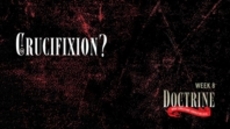
Crucifixion?
May 18, 2008
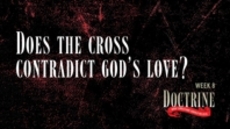
Does the Cross Contradict God's Love?
May 18, 2008
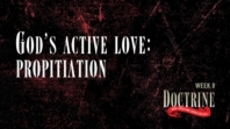
God's Active Love: Propitiation
May 18, 2008
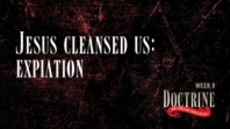
Jesus Cleansed Us
May 18, 2008
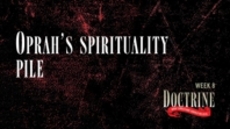
Oprah's Spirituality Pile
May 18, 2008
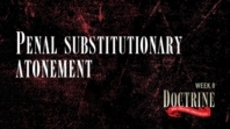
Penal Substitutionary Atonement
May 18, 2008
